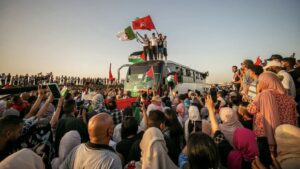By Imraan Buccus
South Africa is a tiny speck on the world map. Our politics and economics rarely warrant a mention on the broadsheets of Moscow, Beijing, London or Washington. Except of course when there is mayhem.
Then the reporting serves to feed the stereotypes of instability, uncertainty and failure to govern. The events of the past month have been ready fodder. There is a well-founded threat of an insurrection against a democratically elected government. The language of economic sabotage found ready evidence in the mass looting and wanton destruction of both state and private infrastructure. The security agencies of the state, whether police, intelligence or military, proved overwhelmed, incapable, compromised or a combination of all three.
Political leadership by and large exposed itself as inept, invisible, internally conflicted or, again, a combination of all three. No one is prepared to take responsibility for the sheer havoc and devastation. What was saved in the flashpoint of KwaZulu-Natal was only due to citizens organizing to protect their communities and placing themselves in harm’s way.
In Ulundi, a veteran nanogenarian politician physically lent his support in the bitter cold of the night to the barricades protecting their little rural town. Those who defended Ulundi came under gunfire sustaining injuries. Further south in Kokstad, a mayor took command to repel both looters and potential insurrectionists.
His local government counterparts elsewhere from Port Edward to Umzinto to Pietermaritzburg and Durban likely sat pontificating on social media while their towns burned. A retired cricket captain fished out his bat in Durban North and likely protected a major food retailer in that region from being looted.
Not so lucky where the Nyuswa and Qadi communities in the ordinarily beautiful Valley of a Thousand Hills. It was from among their number that shops and community facilities were destroyed. It is now a case that both the culprits and the innocents will have to suffer in equal measure by being forced to catch taxis to other towns for something as simple as a loaf of bread or an electricity voucher.
The township of Phoenix stood its ground too. Its malls, clinics and schools remain intact because that community came out in their numbers in the complete absence of either police or politicians and in the full glare of intense provocation especially on social media. The frenzy proved a dangerous cocktail as drug lords and other unsavoury types took the law into their own hands with firearms and other weaponry.
Evidence of brutal beatings and killings have pulled the communities of Phoenix, Inanda and KwaMashu further apart. Evidence of violent deaths of both Africans and Indians hark back to racial conflagration that goes back one and two generations.
There must be no ambiguity that those responsible for the killings must be held accountable in the criminal justice system. The stereotyping of the Phoenix community with inflammatory epithets does not alleviate the pain of those who have lost loved ones. Loose race narratives serve only as a tidy distraction from the mayhem fomented by the insurrectionists and the looters. To rebuild the economy and society and to safeguard the state will mean keeping an eye on the ball. While the airwaves and newsprint buzz with racial vitriol, the architects of the mayhem gleefully relish being let off the hook.
The capitals of the world will be looking at how the powers that be deal decisively with a very real threat to the democratic state. Even though we are a mere dot on the global landscape, South Africa is entwined in the international economic and political system. Rebuilding after the devastation will necessitate investment and borrowings from those power brokers who glance at our dilemmas with disbelief.
Dr Imraan Buccus is Al Qalam editor and senior research associate in the School of Social Sciences at UKZN.


